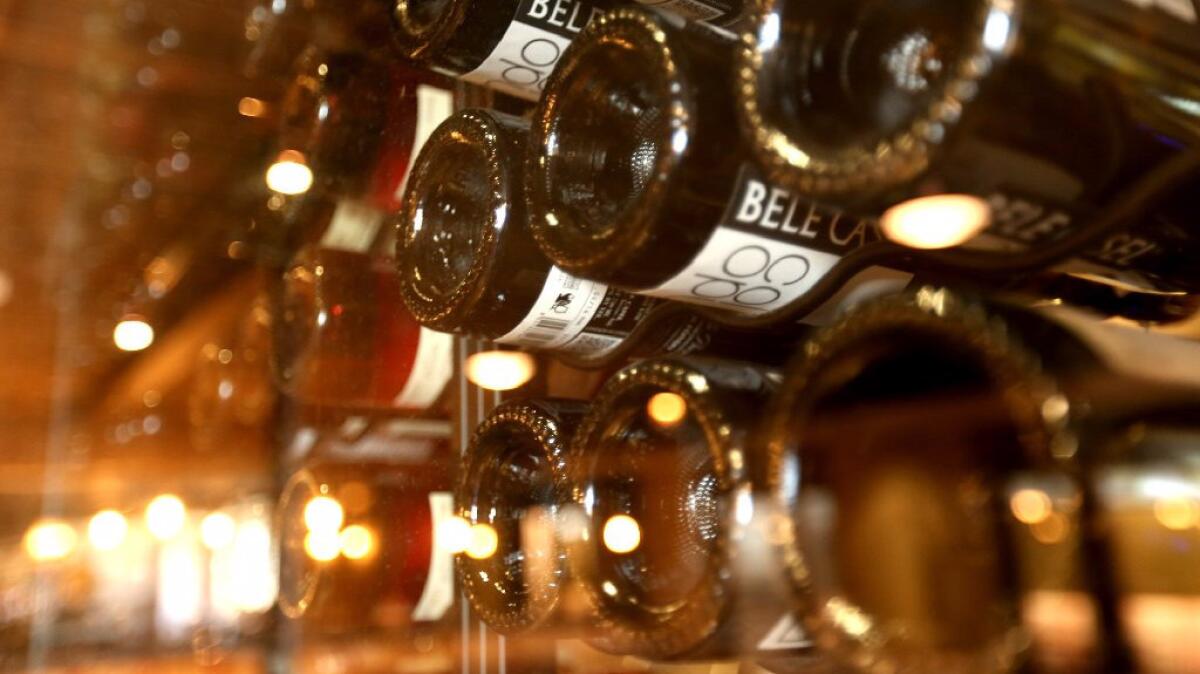Eco-friendly wines aren’t just better for the planet — they taste better too, experts say

Next time youâre looking for a tasty wine pairing, skip the reds, whites and rosĂŠs and just go for the green.
An analysis of more than 74,000 wines found that those made with certified organic grapes got higher ratings from experts than those produced using conventional methods.
âI was surprised by this,â said study leader Magali Delmas, an environmental economist at UCLAâs Institute of Environment and Sustainability.
Napa Valley, Sonoma Valley and the rest of California produce 90% of the wine made in America, according to the National Assn. of American Wineries. Last year, the Golden State had 550,000 acres of vineyards. Only about 2% of them grew organic grapes, which are raised in ways that limit the use of synthetic pesticides and emphasize the importance of a healthy and sustainable ecosystem.
In most aisles of the grocery store, âorganicâ is seen as synonymous with âhigher quality.â Organic apples cost about 30% more, on average, and organic milk carries a hefty 72% markup, data from the U.S. Department of Agriculture show.
But when it comes to wine, an âorganicâ label is often a turn-off. In a 2015 study that asked consumers to select a wine based on its label, organic options were chosen over conventional ones only when the wines were from a region believed to produce low-quality wine. When considering wines from a high-quality region, however, consumers chose the conventional option, even if it had a higher price.
To get around this anti-organic bias, about two-thirds of the certified wineries in California opt not to display the organic label on their bottles, Delmas said.
âThey donât want to talk about it to the consumer,â she said.
But it turns out the experts see â and taste â things differently.
Delmas and her colleagues gathered reviews from Wine Spectator, Wine Advocate and Wine Enthusiast for tens of thousands of wines produced between 1998 and 2009. The vino came from 3,842 wineries and varied by region, age and type. Only 1% of the wineries in the sample were certified organic.
Each publication performs blind tastings and assigns a score between 1 and 100, with most falling somewhere above 80. Thereâs no way for taste-testers to know whether the wine theyâre sampling is organic.
When the researchers compared the scores of wines of similar vintages and varietals, they found that wines produced from certified organic grapes scored 4.1 points higher, on average, than wines made with conventional grapes.
There could be a biochemical explanation for this, Delmas said. Conventional grape-growing practices use pesticides that can reduce the tiny microbes in soil. In contrast, vineyards that follow organic practices may be allowing more of the regional characteristics to get into their bottles.
A study published in June suggested that these microbes can contribute to the terroir â the traits of the region, soil and climate that help give each wine a unique taste.
Kaan Kurtural, a professor in the Department of Viticulture and Enology at UC Davis, offered another reason for the difference in quality. Organic grapevines produce about one-third as much fruit as conventional grapevines do, so they tend to have thinner canopies and the grapes get more sun.
âSince itâs more exposed, youâre going to see a lot more fruit-forward flavors, like cherry,â Kurtural said.
And indeed, when Delmas and her team examined the descriptive terms experts used in their wine reviews, they found that âcherryâ was the most common word for reds made from organically grown grapes.
The researchers also found that the longer a winery had been certified, the higher its wines scored. In addition, the more cases of wine a winery produced, the lower the scores. The findings were published this week in the Journal of Wine Economics.
Though experts seem to think highly of bottles from organic vineyards, it remains to be seen whether consumers can be persuaded to agree.
Delmas says she hopes her research will encourage winemakers to be more forthcoming about their organic certification.
âI think this will help move things in that direction,â Delmas said. If not, she added, âitâs a missed opportunity.â
Follow @mdaley_ on Twitter for more science news and âlikeâ Los Angeles Times Science & Health on Facebook.
MORE IN SCIENCE
Martian gully theory doesnât hold water, study finds
Deep space travel might blow your mind, but it could be bad for your heart
Scientists find only one true wolf species in North America



